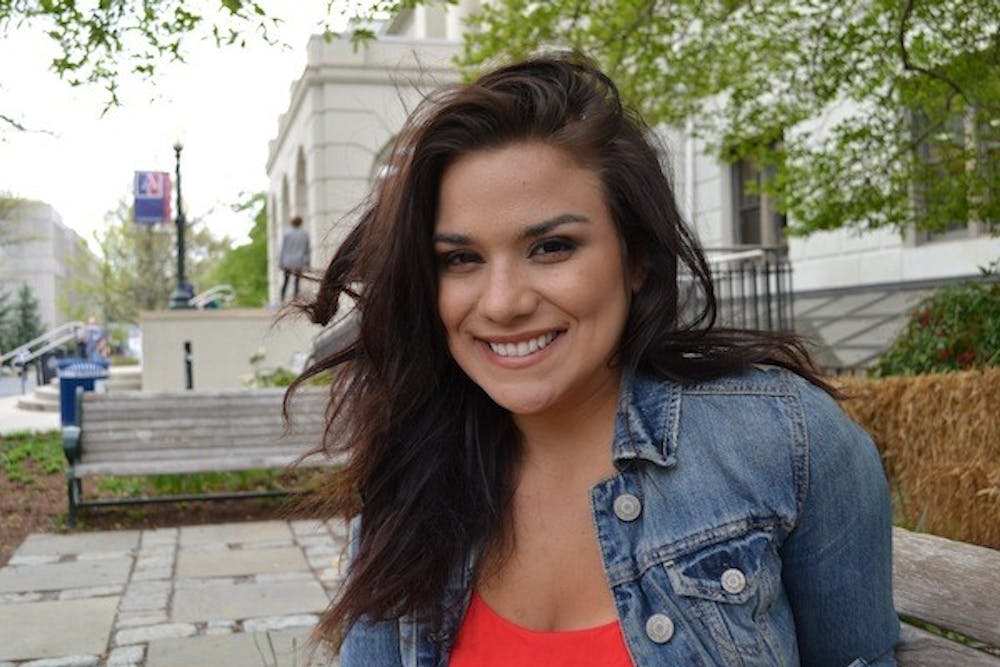Kaitlyn Dinneh Wozniak has competed in beauty pageants ever since she was five years old. Before entering the image-conscious lifestyle, she made an agreement with her mother that once she expressed unhappiness with the competitions, her mother would allow her to stop.
But the competitive drive was strong, and she continued to enter into pageants like Miss Maryland Teen USA and Miss D.C., which she won in 2012.
A senior in the College of Arts and Sciences, Wozniak led a perfect life on the surface. But for many years, she was afflicted with the condition of anorexia nervosa.
Although at the time she did not know the name of her disorder, she was well aware, as were those around her, that something was painfully amiss.
“Neither my family nor myself really knew what was going on,” Wozniak said. “We didn’t know anything about eating disorders. My mom just knew that I wanted to lose weight after going through puberty early and receiving unwanted attention based on the changes in my body.’”
Wozniak’s mother began noticing differences in her behavior, from restricting her own food intake, to becoming more aggressive and irritable. Her fear of weight gain had caused her to become indignant at those who tried to help regulate with her rituals surrounding food and exercise.
A watershed moment for Wozniak was when her mother noticed that her Miss Maryland USA dress was falling off because of the weight loss.
“I had no life in my eyes and my smile was forced,” Wozniak said. “I think for her, seeing me from the perspective of an audience member, and not as my mother, allowed her to step back and accept that something was really wrong.”
Friends began noticing that Wozniak’s anorexia was spiraling out of control, and eventually she was taken to Johns Hopkins Hospital for her initial assessment.
Days before Wozniak’s 15th birthday, she was diagnosed with anorexia nervosa.
“I hated putting my family through that long day and I was scared to know what would happen next, but I also felt an overwhelming sense of excitement and pride,” Wozniak said. “I had finally reached the title of ‘anorexic’ and could be deemed ‘sick enough.’
“This is a common theme with eating disorders: the ambivalence and contradictory feelings; you know what you’re doing is wrong but you don’t want to stop.”
The road to recovery was strewn with a trail of broken glass, as Wozniak would have died had she not been admitted as an inpatient on that day, the doctors said. The refeeding process began and she eventually recovered enough and enrolled in AU to study psychology.
“After the second time of going through treatment, I really was able to grasp the concept that my eating disorder was never about food, but about control,” Wozniak said. “Once I knew that, and once I was able to maintain a healthy weight, I knew I wanted to share my story.”
According to the National Eating Disorder Association (NEDA), 90-95 percent of people who suffer from anorexia nervosa are girls and women. After going through the affliction herself, Wozniak decided to use her title as Miss D.C. for a good cause. She started by tackling stereotypes surrounding pageant culture and encouraging people to transcend boundaries of conventional thought.
“The great majority of the women I have met in my pageant days are some of the most dynamic, intelligent and considerate people I know, and they strive to live healthy lives.”
Wozniak said that if there is the need to speak to someone then do so because the first step to recovery is to seek help.
“Recovery is possible,” Wozniak said, “but it is up to you to step outside of your comfort zone and make that decision to reclaim your life from the grips of your eating disorder.”
dkahen-kashi@theeagleonline.com





